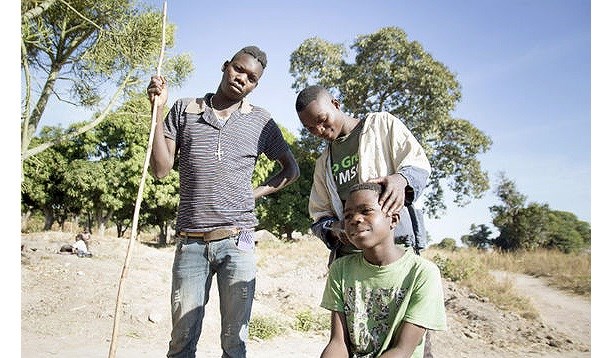"Whenever I am with energetic young people, I feel like a recharged battery," Nelson Mandela once said. The youth of Africa was to the fore in the mind of billionaire philanthropist Bill Gates too, when he delivered the annual Nelson Mandela lecture in Pretoria recently.

Image Source: African Agri Council - Stephen Kangwa (seated, 15) with friends Mwansa and Rabat. (Image taken by photographer Andrew Barker in an Irish Aid backed Self Help Africa project in remote Northern Zambia.)
Youth and innovation
Highlighting data that predicts that two billion babies will be born on the African continent in the next 35 years, Gates spoke about the role that young people, as innovators, can play in Africa’s future. “Young people are better than old people at driving innovation because they are not locked in by the limits of the past,” he said.
Africa has the youngest population in the world, with approximately one in five on the continent aged between 15 and 24 years. That’s over 200 million people. This demographic represents both a great opportunity and a great challenge for the region.
When we speak about youth and innovation, we think of the urban environment, of technology and startup businesses. But at Self Help Africa, we see the vast potential that youth holds for Africa’s rural areas and, in particular, for its farms.
Africa’s farming sector needs the resource of youth more than any other food producing region on earth. Although the continent’s population is the youngest in the world, its farmers are the oldest – with the average age of land-holders in many countries in Sub-Saharan Africa reaching almost 65 years. In the West, that’s retirement age.
A challenge facing farm production in Africa
Therein lies a significant part of the challenge that faces farm production in Africa.
I recently returned from Uganda, where Self Help Africa has just started work on an EU-backed project that seeks to create employment and income-generating opportunities for 3,000 young people between the ages of 15 and 27 years in the country’s northwest. The three-year project will work with 1,500 young men and 1,500 women, and create job and self-employment opportunities for these people within their home region.
In Northern Uganda, as in many remote parts of Africa, there is frequently a disconnection between young people and the land, which is the most likely source of income and opportunity they are likely to find. But many young people in Sub-Saharan Africa have a negative view of farming. It’s hard work, challenging, and, undertaken mainly with hand tools, has historically represented a grinding struggle just to survive.
The fact that in many instances, young people do not have access to land – for reasons of social hierarchy – encourages them to turn their attentions elsewhere, in the hope of making their way in the world. As a direct consequence, in the early 21st century Africa has some of the fastest growing cities, and impoverished shanty towns, in the world.
Work needs to be done
I believe that the young people of Africa are a vital element in the ongoing effort to drive growth in the agricultural sector, and create a future for the continent’s young population.
But work needs to be done at a State level to unlock opportunities for young people in rural Africa, by facilitating access to land ownership and to financial services – startup finance being one of the major obstacles to starting activities on a farm.
The non-profit sector, too, has a crucial role to play. We can support rural young people to achieve their full potential by training them to grow improved and sustainable crops. But that’s not enough. By also linking young farmers to markets, we can help them transform their farming activities into profitable businesses, improving their livelihoods on the long-term.
Innovation will also be key if we are to succeed in the challenge of driving Africa’s young labour force into the agricultural sector. New technologies can allow us to reach individuals in remote areas and to give them access to extension services and early weather warnings.
In late 2015, the new Sustainable Development Goals announced by the United Nations set a target of ending hunger by 2030. I believe that this target will be missed if the youth is left behind in our global development efforts.
































